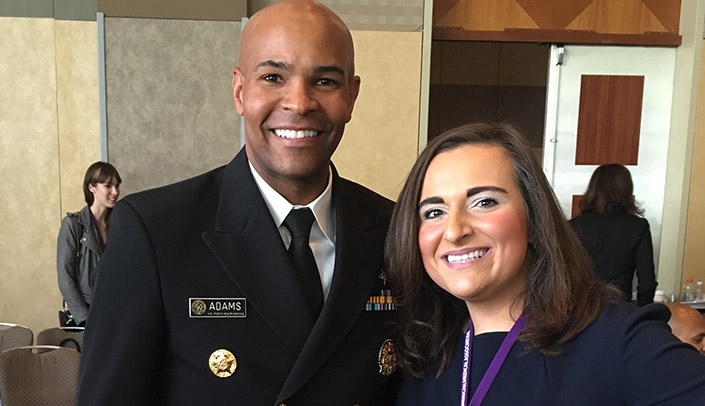Alëna Balasanova, M.D., director of addictions education at UNMC and assistant professor in the UNMC Department of Psychiatry, got high-fived by the United States surgeon general in June.
The occasion: Dr. Balasanova’s resolution, “Destigmatizing the Language of Addiction,” had just been heard by the American Medical Association Science and Technology Reference Committee at the AMA’s June meeting.
Destigmatized language
Substance misuse (not substance abuse)
The use of any substance in a manner, situation, amount, or frequency that can cause harm to users or to those around them. For some substances or individuals, any use would constitute misuse (e.g., underage drinking, injection drug use). Use of the term “abuse” is stigmatizing and should be avoided whenever possible.
Substance use disorder (not substance abuse disorder)
A medical illness caused by repeated misuse of a substance or substances. A severe substance use disorder is commonly called an addiction.
Vice Admiral Jerome Adams, M.D., the surgeon general of the United States, had made a surprise appearance in front of the committee to speak in support of the resolution, which directs AMA members to use clinically accurate, non-stigmatizing terminology in all resolutions, reports and educational materials regarding substance use and addiction.
Dr. Balasanova called the surgeon general’s testimony a shock.
“I knew he was at the meeting, but I had no idea that he was going to show up to my reference committee specifically to support this resolution,” she said.
“It was very validating. He shared, very candidly, a story about his younger brother, who has mental illness and substance use disorder and is incarcerated, and he spoke about the importance of reducing stigma, and how sharing his story will help do that as well, because this can afflict anybody if it afflicts the surgeon general’s brother.”
Afterward, Dr. Balasanova told Dr. Adams that she had written the resolution, getting a high-five in return.
Dr. Balasanova was inspired to write the resolution by a 2016 article in the Journal of the American Medical Association article on changing the language to addiction.
“It was there that I actually first learned just what power our words can have,” she said. “I always thought it was important to be saying the right things, but I didn’t know it could actually impact patient care. When I learned it did, I really started taking measures to try to change the way I talk about things and really impart this to medical students and residents.”
Dr. Balasanova first wrote a resolution to the Nebraska Medical Association through the Metro Omaha Medical Society. When it passed unanimously in the Nebraska Medical Association, she decided to modify it for the AMA.
“The testimony before the committee was unanimously positive, as well,” she said.
With its passage following the testimony, Dr. Balasanova’s resolution becomes national policy on behalf of the 200,000 physicians who are part of the AMA, the most influential physician group in the country and the world.
Plus, the surgeon general gave her that high-five.
